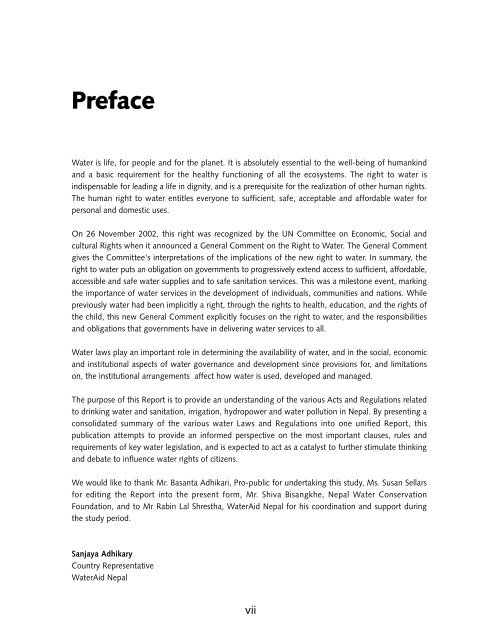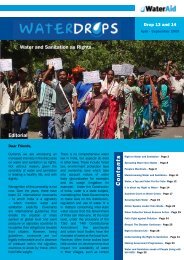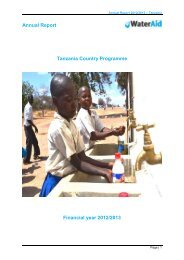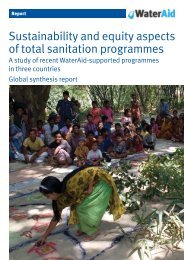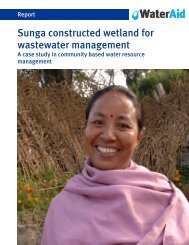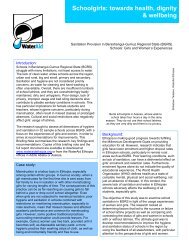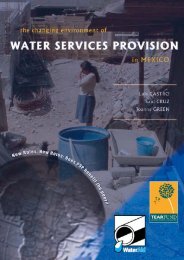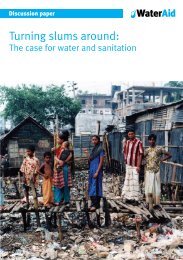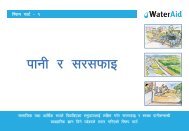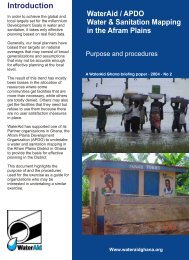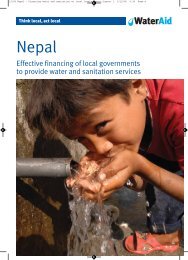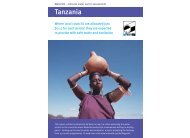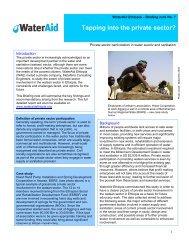Water laws in Nepal - WaterAid
Water laws in Nepal - WaterAid
Water laws in Nepal - WaterAid
You also want an ePaper? Increase the reach of your titles
YUMPU automatically turns print PDFs into web optimized ePapers that Google loves.
Preface<strong>Water</strong> is life, for people and for the planet. It is absolutely essential to the well-be<strong>in</strong>g of humank<strong>in</strong>dand a basic requirement for the healthy function<strong>in</strong>g of all the ecosystems. The right to water is<strong>in</strong>dispensable for lead<strong>in</strong>g a life <strong>in</strong> dignity, and is a prerequisite for the realization of other human rights.The human right to water entitles everyone to sufficient, safe, acceptable and affordable water forpersonal and domestic uses.On 26 November 2002, this right was recognized by the UN Committee on Economic, Social andcultural Rights when it announced a General Comment on the Right to <strong>Water</strong>. The General Commentgives the Committee's <strong>in</strong>terpretations of the implications of the new right to water. In summary, theright to water puts an obligation on governments to progressively extend access to sufficient, affordable,accessible and safe water supplies and to safe sanitation services. This was a milestone event, mark<strong>in</strong>gthe importance of water services <strong>in</strong> the development of <strong>in</strong>dividuals, communities and nations. Whilepreviously water had been implicitly a right, through the rights to health, education, and the rights ofthe child, this new General Comment explicitly focuses on the right to water, and the responsibilitiesand obligations that governments have <strong>in</strong> deliver<strong>in</strong>g water services to all.<strong>Water</strong> <strong>laws</strong> play an important role <strong>in</strong> determ<strong>in</strong><strong>in</strong>g the availability of water, and <strong>in</strong> the social, economicand <strong>in</strong>stitutional aspects of water governance and development s<strong>in</strong>ce provisions for, and limitationson, the <strong>in</strong>stitutional arrangements affect how water is used, developed and managed.The purpose of this Report is to provide an understand<strong>in</strong>g of the various Acts and Regulations relatedto dr<strong>in</strong>k<strong>in</strong>g water and sanitation, irrigation, hydropower and water pollution <strong>in</strong> <strong>Nepal</strong>. By present<strong>in</strong>g aconsolidated summary of the various water Laws and Regulations <strong>in</strong>to one unified Report, thispublication attempts to provide an <strong>in</strong>formed perspective on the most important clauses, rules andrequirements of key water legislation, and is expected to act as a catalyst to further stimulate th<strong>in</strong>k<strong>in</strong>gand debate to <strong>in</strong>fluence water rights of citizens.We would like to thank Mr. Basanta Adhikari, Pro-public for undertak<strong>in</strong>g this study, Ms. Susan Sellarsfor edit<strong>in</strong>g the Report <strong>in</strong>to the present form, Mr. Shiva Bisangkhe, <strong>Nepal</strong> <strong>Water</strong> ConservationFoundation, and to Mr Rab<strong>in</strong> Lal Shrestha, <strong>Water</strong>Aid <strong>Nepal</strong> for his coord<strong>in</strong>ation and support dur<strong>in</strong>gthe study period.Sanjaya AdhikaryCountry Representative<strong>Water</strong>Aid <strong>Nepal</strong>vii


